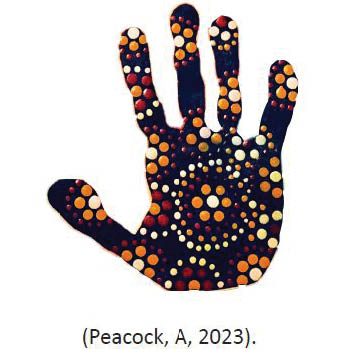Sorry Day is a feeling.
It is a day that you imagine the footprints left behind by a child that is then filled by a different footprints in the sand of an adult. Not a worn footprint but a new footprint returning sometimes to what they once lost. It is a day of remembrance where grief flows like a river through the community.
Mothers wait for the creak of the door that once held a small hand on the worn, twisting knob. They do not recognise who now comes in the door. Sometimes that door does not creak again in the same way.
Sorry Day passes on grief. It does not pass on values of warmth in a house now lost. It doesn’t pass on how to knit or weave by watching your grandmother’s hands. It doesn’t pass on how to prepare a damper, helping to knead the flour and butter with your mother. It doesn’t pass on how to stop a cough in small children with lemon myrtle. It doesn’t pass on the right bait needed for fishing for yellow belly barramundi with uncle. It doesn’t share the same hazel eyes of a cousin that is missing as well.
Sorry Day is a day to remember what we had and what we never had. Every ghostly gum on country that stands is a reminder of the shadow of the children that left. The country said “Sorry” once. But for mob it continues to be sorry every day. For some families they experience children in care or incarceration being lost again today. Just as the wood is burnt in a campfire, once values are lost, they cannot be re-ignited.
On country, we all live with sorry, we all live with sadness. As the seasons change and the sands shift and the leaves fall, a new summer arrives with the bright sun of possibilities. Supporting one another is the best way to keep bonds tight. We care and hug until the trauma leaves and a person can walk themselves. We pour cups of tea until the person can boil the billy for others. We may be sorry but we still love and care for country and mob. Because I am, you are, we are Lasallian. This means, we too, feel the same emotions as one mob (Isaacs, K, 2023).
Why do we commemorate National Sorry Day?
The following excerpt from First People Recruitment Solutions perfectly sums up the reasons why Australia as a nation commemorates National Sorry Day:
‘National Sorry Day marks the anniversary of the day, in 1997, when the “Bringing Them Home” report, the result of a Human Rights and Equal Opportunity Commission inquiry, was first tabled in parliament. The report documented the forced removal of many Aboriginal and Torres Strait Islander children from their families, which occurred between 1910 and the 1970s, and made recommendations for confronting and addressing past wrongs.
The children, many of whom suffered significant trauma from the experience, were often subjected to harsh living conditions and abusive treatment within institutions and encouraged to reject their culture and feel ashamed of their Indigenous heritage. These children – an estimated 10-33% of all Indigenous children during this period – became known as the Stolen Generation, and many people today are still coming to terms with this breach of fundamental human rights’ (First People Recruitment SoluWons, 2021)
Who are the Stolen Children?
It is estimated that ‘between one in three and one in ten indigenous children were removed from their families under past government policies but could not be more precise due to the poor state of the records’ (Racism no Way, 2016).
These children were purportedly removed from their families and homes in an effort to protect them and ‘save them from a life of neglect’ (The Australian Museum, n.d.) The stolen children were also forced to denounce their indigenous heritage and their families. We must ask ourselves; were these tactics effective?
The stories contained in the Stolen Generations Testimonies suggest otherwise (Stolen GeneraWons TesWmonies, n.d.)
Rita Wright’s story is just one of many similar stories recounted by stolen children. She and her sister were removed from her family at Brewarrina and brought to the Marella Children’s home in Kellyville:
‘We worked as slaves, you know, the children. We were only kids. Marella was a farm, they had a big paddock there was all plum trees.
We had to pick the plum trees, climb up in the tree and pick as many, even though it took all day to do it. We had animals, we had kangaroos.
Chris, she used to do the kangaroos, we used to do the chooks.
They – he had prize pigeons. Some[mes I felt like just le\ng them all go cause I hated the farm.
My sister, Dawn, used to milk the cows and bring it back up in the buckets and put it in the big freezer. We had to skim it, get the cream off. Make the bu^er every morning before we went to school.
Do all the washing. Three lines of washing every day.
Every morning before we went to school. We used to stand up on a box cause we was too li^le.
And do it in the winter, in the rain, no shoes. Fix the toilets up when they was blocked.
But not, not the educa[on, I missed out on educa[on’
(History of Aboriginal Sydney, n.d.)
Lasting impacts felt by the Stolen Generation
The impacts felt by the Stolen Generation are many and varied, depending on the individual and their experiences. There are, however, recurring themes revealed in the stories they have recounted:
-
feelings of detachment from family and Country
-
an inability to form attachments to their own families/children/heritage
-
substance abuse
-
criminal behaviours/domestic violence/youth detention and incarceration
-
anxiety and other mental ill health disorders
-
low self esteem
-
deep mistrust of ‘authority’ figures
-
internal guilt (Stolen GeneraWons TesWmonies, n.d.)
These impacts are far reaching, destructive and debilitating and may never be expunged, given the original recipients, the Stolen Children, may never come to terms with the experiences they were forced to endure.
Perhaps the following poem by author Pauline McLeod, herself a stolen child, best sums up the pain, loss and anguish felt by The Stolen Generation:
THE SEARCH BEGINS
They had taken away my family!
The child within me cried, The stolen life, the agony Of many a year gone by.
The cover up; the pretence. The falsehood: All those lies.
Didn't they know I'd find out the truth one day, And now I just ask WHY?
All their words and all their kindness Can never fill the pain. Can I ever trust the people, That I believed in, once again?
They stole me from a life[me, My heritage. My home. My family. My iden[ty.
My spirit all alone. But to let them win, would be a sin.
To give up would be a crime.
I must search on. I must fight on.
To find what is righfully mine.
To find my heritage; my family. My home and iden[ty.
To find the person who was lost to me.
Me… the Aborigine!
Poem by Pauline McLeod [30]. 1994 (McLeod, Pauline, n.d.)
Click HERE to download the article
Click HERE to download classroom resources
(Author: Alison Peacock and Karen Isaacs)
- Log in to post comments

